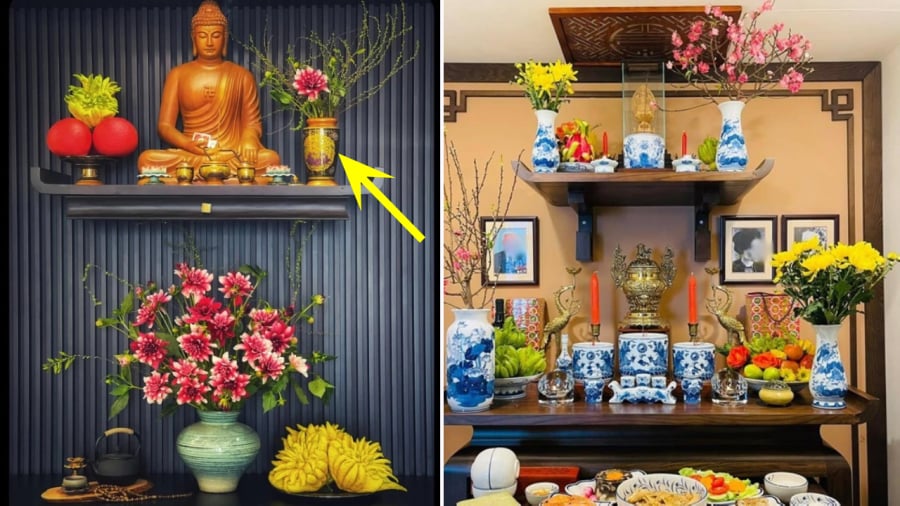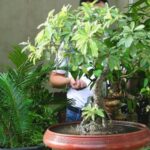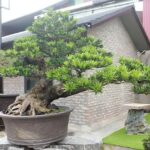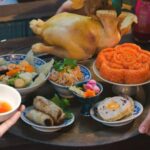Altar Rules: Flowers on the Left, Fruit on the Right
Fresh flowers and fruits are indispensable offerings on the altar of deities and ancestors in Vietnamese families. When placing these items on the altar, one must pay attention to their positioning. Each item has its designated place, ensuring reverence and solemnity, as well as conveying positive meanings in worship.
The flower vase and fruit tray on the altar follow the principle of “East for flowers, West for fruits.” This means the flower vase is placed on the eastern side, while the fruit tray goes on the western side. This principle has ancient roots, stemming from the natural law of the sun rising in the east and setting in the west, and trees blooming before bearing fruit. Thus, in worship, the rule is to place flowers in the east and fruits in the west.
To determine the orientation of flowers and fruits on the altar, the homeowner can look from the perspective of the altar outwards. The left side (or the ‘left’ of the deities) is considered east, and the symmetrical right side (or ‘right’ of the deities) is considered west.

The flower vase and fruit plate on the altar follow the “East for flowers, West for fruits” principle.
Notably, the ancestor altar is usually facing south, so placing the flower vase in the east allows the gentle fragrance to permeate the worship area when the southeast wind blows. Placing the fruit plate on the right (west) facilitates convenient arrangement.
Note that this “East for flowers, West for fruits” principle applies when there is only one flower vase on the altar.
In cases where two flower vases are displayed, they are placed on either side of the altar for symmetry. Then, the fruit plate is positioned in the center, in front of the incense burner. This arrangement brings harmony and elegance to the worship area.
Depending on the altar’s size, homeowners can choose to place one or two flower vases as preferred.
The flower vase and fruit plate should be proportionate in size to the altar, neither too big nor too small, to maintain balance.
Some Taboos in Altar Feng Shui
– Unclean and Untidy Altar
The altar represents the homeowner’s sincerity towards deities and ancestors. A messy and unclean altar reflects a lack of sincerity and respect for the higher powers. This is one of the most significant taboos in worship.
Maintaining a tidy and clean altar is not difficult. Homeowners should pay attention to cleaning the altar each time they light incense, arranging the altar items in their proper places, refraining from placing unrelated items on the altar, and promptly removing wilted flowers…
– Altar Facing the Bathroom Door
The bathroom is a damp place that accumulates impure qi. Having the altar face the bathroom door compromises the cleanliness of the worship area, which is a feng shui taboo.
If it is impossible to rearrange the positions of the altar and the bathroom, the homeowner should keep the bathroom door closed when not in use. Additionally, a screen or partition can be used to separate the bathroom and the altar.
Furthermore, the back of the altar should not lean against the bathroom wall. For multi-story houses, there should be no bathroom directly above the altar.
– Altar Facing the Main Entrance
The altar is a place of tranquility and solemnity. Homeowners should avoid positioning the altar directly facing the main entrance, as external qi can cause disturbances and disrupt the altar’s serenity.
Information for reference only.
The Magic of the Fig Tree: Unveiling Ancient Secrets for Prosperity
The mulberry tree is a beloved and popular choice for gardeners and homeowners alike. This unassuming yet majestic tree has a unique significance in the ancient art of Feng Shui, and its placement can bring about a myriad of benefits. The ancient practice of planting mulberry trees is a fascinating one, and it is said to bring good fortune and prosperity to those who embrace it.
The Magic Trio: Plant These 3 Trees to Invite Prosperity and Improve Your Luck
For centuries, our ancestors have passed down a wealth of knowledge and beliefs about Feng Shui, including the concept of planting ornamental plants in front of our homes. Among these beliefs, three particular types of plants are thought to bring not just wealth and luck but also prosperity and flourishing growth to the household.






































